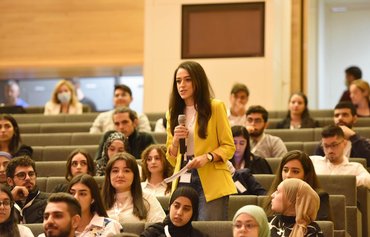Terrorism and sectarianism, and their impact on Lebanon's economic stability, are the biggest hurdles youth face as they start their careers, driving many of them to seek opportunities abroad.
More than 130 students from 23 Lebanese universities gathered February 8th at Monroe Hotel in Beirut to discuss the problems they face related to terrorism, sectarianism, corruption, immigration, education and jobs at a forum organised by the Civic Influence Hub (CIH).
The dialogue was held as part of CIH's national initiative to develop a comprehensive picture of national security and its impact on all levels of Lebanese civil society.
CIH previously held similar dialogue forums with civil society organisations, economic entities, professional syndicates and municipalities.
Terrorism 'biggest problem'
"We as students, just like other members of the community, are suffering from the growing phenomenon of terrorism, both directly from terrorist acts such as bombings in public places and indirectly from the recruitment of the youth," said Julien Bsaibes, an advertising student at the faculty of information and communication at Antonine University in Beirut.
Bsaibes attended the recent forum where he told Al-Mashareq that terrorism is "the biggest challenge we face as young people because terrorist groups are targeting our age group for recruitment".
Terrorism has an adverse effect on Lebanon's stability, its economy and the tourism sector, he said.
The tourism sector "is one of the largest sources of jobs for university students, providing 121,000 direct jobs and 205,000 indirect jobs in 2015, and enabling us students to cover our university expenses", he said.
"However, [tourism employment] declined in 2016 due to the terrorist acts that targeted tourist sites, not to mention the recruitment of more youth into the ranks of terrorist groups," he said.
Deteriorating social and financial circumstances, a lack of a sense of national belonging and ignorance are among the factors that drive youth into the ranks of terrorist groups, Bsaibes said.
That the government does not provide free health care or opportunities for jobs, contributes to the problem, he said.
These issues, compounded by sectarianism, are pushing some youth to migrate for search of better prospects, he said.
Growing sectarianism, apprehension
Mohammed Shamas, a law student at the Lebanese University and president of the faculty of law's student council, linked the growth of extremism among Lebanese youth to "sectarianism in all its forms".
University students, and society in general, "are apprehensive about the growth of political sectarianism under a religious and sectarian cover with politicians using sectarian rhetoric to advance their personal interests", he told Al-Mashareq.
The sectarian mobilisation Lebanon is witnessing "has led to sectarian extremism and pushed the youth towards groups that fuel this sort of thinking", he said.
Shamas said this divisiveness has had a negative impact on university students, their relationships with each other, their education and their future.
"Sectarianism and the problems it brings about, which reached the point of religious and sectarian extremism, is behind the phenomena of violence and terrorism," he said.
"Therefore, we as students preparing to build our future, bear the responsibility and duty towards ourselves and our nation to work on building a nation that embraces 18 sects under its wings," he said.
"We must all stand together and put our hands, minds and hearts together to produce an intellectual revolution [...] to rise above sectarianism and denominationalism and besiege terrorist ideology in order to build a better future that ensures the survival of all us, in all our sects, in Lebanon," Shamas said.
Obstacles to job opportunities
Elias Howayek, a member of CIH's Board of Trustees and Directors, said terrorism and sectarianism are an obstacle to the youth and "a barrier blocking their path to the labour market and educational and professional development".
"They know that sectarian sorting and interference affects the quality of education, and that terrorism represents a huge obstacle blocking their access to job opportunities, not to mention their fear over the fact that some of them may be drawn to terrorism, which is spreading at the expense of declining employment and social comfort," he told Al-Mashareq.
"Students sense the danger of sectarianism and what it could lead to down the road in terms of the spread of extremist ideology," Howayek said.
CIH listened to students' concerns and they are the same expressed by other sectors of the community, he said.
"We will be discussing [these concerns] in an all-inclusive national forum to be held between April and May, to apply positive pressure on officials [and spur them] to address the problems and concerns of the Lebanese, and paint a bright future for Lebanon," he said.

![University students participate in a dialogue forum February 8th organised by the Civic Influence Hub, where they expressed their concerns about terrorism, sectarianism and their futures. [Photo courtesy of the Civic Influence Hub]](/cnmi_am/images/2017/02/24/7312-civic-forum-lebanon-600_384.jpg)






